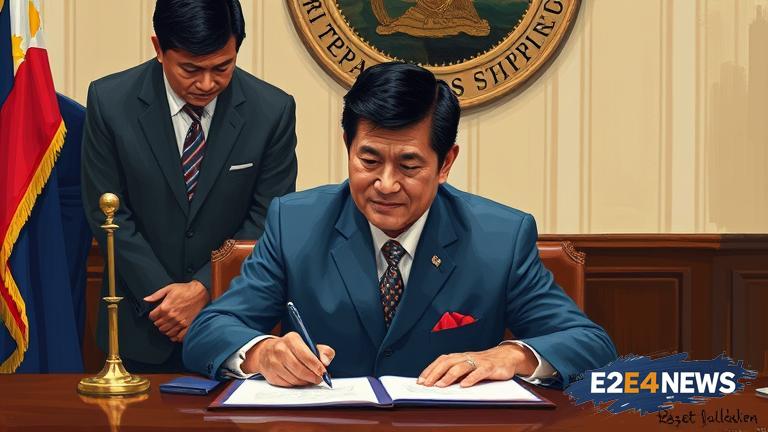In a significant move to streamline the Philippine government, President Ferdinand Marcos Jr. has signed a bill that grants the President the authority to reorganize executive agencies. This landmark legislation is expected to improve the efficiency and effectiveness of the government, allowing for better delivery of public services. The bill, which was passed by Congress earlier this year, aims to reduce bureaucracy and promote a more agile and responsive government. With this new power, the President can now reorganize, merge, or abolish executive agencies, as well as create new ones, without needing to go through Congress. This is seen as a major breakthrough in the government’s efforts to reform its bureaucracy and make it more responsive to the needs of the people. The President has stated that the reorganization of executive agencies will be done in a way that will promote transparency, accountability, and good governance. The move is also expected to reduce corruption and improve the overall performance of the government. The bill has been welcomed by many as a positive step towards improving the country’s governance and promoting economic growth. However, some have expressed concerns about the potential risks of abuse of power and the need for careful implementation. The President has assured the public that the reorganization will be done in a fair and transparent manner, with the participation of all stakeholders. The government has also announced plans to conduct a thorough review of all executive agencies to identify areas of improvement and streamline processes. This move is seen as a key part of the government’s efforts to achieve its development goals and improve the lives of Filipinos. The President has also stated that the reorganization will be guided by the principles of good governance, including transparency, accountability, and participation. The government has also committed to ensuring that the rights of employees and stakeholders are protected during the reorganization process. The bill has been hailed as a major achievement for the Marcos administration, which has made governance reform a key priority. The President has expressed his gratitude to Congress for passing the bill and has pledged to work closely with all stakeholders to ensure its successful implementation. The reorganization of executive agencies is expected to have a significant impact on the country’s economy, with many predicting that it will lead to increased investment and job creation. The government has also announced plans to invest in digital infrastructure and technology to support the reorganization and improve the delivery of public services. Overall, the signing of the bill is seen as a major step forward for the Philippines, and is expected to have a positive impact on the country’s governance, economy, and people. The government has also committed to monitoring and evaluating the impact of the reorganization and making adjustments as needed. The President has also called on all Filipinos to support the government’s efforts to reform its bureaucracy and promote good governance. The reorganization of executive agencies is a complex process that will require careful planning and implementation, but the government is confident that it will lead to significant improvements in the delivery of public services and the overall performance of the government.





